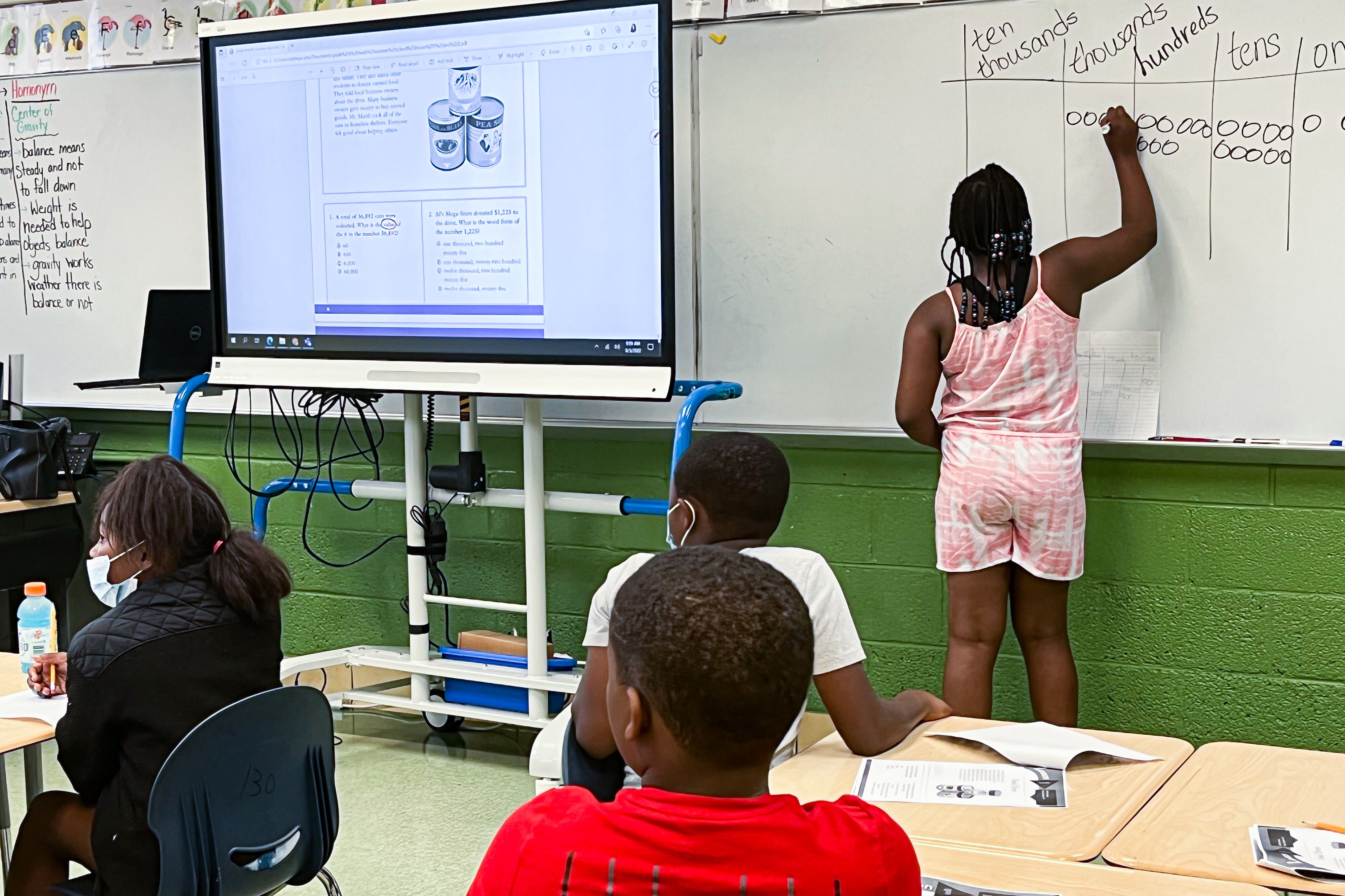Sign up for Chalkbeat Detroit’s free daily newsletter to keep up with the city’s public school system and Michigan education policy.
Michigan standardized test results for grades 3 through 7 last year remained below pre-pandemic levels in math and English language arts, but there were also some year-to-year gains.
Results on the spring’s Michigan Student Test of Educational Progress, known as the M-STEP, were released Thursday. The data underscore continuing challenges that reverberate beyond Michigan, as U.S. schools attempt to steer students back on track after years of disruption tied to COVID.
The M-STEP is an important marker of academic progress, affecting everything from the amount of aid districts receive for tutoring, to teacher evaluations and, potentially, which low-performing districts are targeted for state intervention.
State and district leaders will examine the results closely as they make decisions about how to most effectively distribute what remains of the $6 billion in federal COVID relief funding that Michigan received, before that money runs out this year.
“If these scores show stalling, then we really essentially have between now and the end of this school year to figure it out for kids. Otherwise their lives will be permanently impacted,” said Marguerite Roza, director of the Edunomics Lab and research professor at Georgetown University. “It’s sort of now or never.”
Key takeaways from the results released Thursday:
- Of the 20 assessments given to students across grades, results in 15 areas improved in 2023 from spring 2022 testing. Results fell in four others and remained the same on one test.
- Michigan students in grades 3 through 7 showed slight improvements in math during 2022-23 from the previous year.
- But students still have far to go to reach pre-pandemic levels. The drop in the proficiency levels when compared with 2018-19 was widespread. That was true for low-income students and for students from more affluent families.
- In almost every grade and in both English language arts and mathematics, proficiency rates fell between 2018-19 and 2022-23, with a persistently wide gap between poor children and those from more affluent families.
- In third grade, 27.6% of students from low-income families were proficient in English language arts in 2022-23, a drop of 3.7 percentage points from 2018-19. Among the non-poor, 59.2% were proficient, a drop of 3.6 percentage points.
- The drops were steeper in sixth and seventh grades for students of different income levels in English language arts and math. For instance, 15.7% of low-income sixth graders were proficient in math in 2022-23, down 4.4 percentage points. More affluent sixth graders saw a bigger drop, from 52.1% in 2018-19 to 46.8% this year.
The M-STEP is given each spring to students in grades 3 through 7 in English language arts and math. Fifth grade students also take the science and social studies M-STEP. (Eighth graders take the PSAT 8/9 test for English language arts and math, and 11th graders take the SAT for English language arts and math.)
In typical years, schools would be able to compare M-STEP results year by year to measure student progress. But the pandemic upended that rhythm — with the annual test being canceled in 2020 as COVID-19 ended the school year early. Disruptions continued through 2020-21, when the test was optional, resulting in fewer than 75% of Michigan students taking the exam.
That has left educators to compare this year’s results with scores dating back to 2018-19, the last year of full testing before the pandemic, to gauge learning loss.
Third graders had big setbacks
- Just 36.9% of Michigan seventh graders were deemed proficient in English language arts this year, compared with 42.7% in 2018-19, a 5.8 percentage-point drop.
- Among sixth graders, 29.6% were proficient in math this year, down from 35.1% in 2018-19.
- Some populations of at-risk students showed even greater learning loss than the overall student populations. In Detroit public schools, for example, English language learners dropped from an 18% pass rate in English language arts during 2018-19 to 14% in 2022-23. In math, the same group dropped from a 16% pass rate to 11%.
Michigan third graders, who were in kindergarten when the pandemic hit, took state standardized tests for the first time this spring as third graders. Just 40.9% of these students were deemed proficient in English language arts, compared with 45.1% during 2018-19. The latest results were also below the 41.6% level for third graders in 2021-22.
“This past year’s third graders were perhaps the most adversely affected of any age cohort, as they had pandemic-influenced school years during grades kindergarten through second grade, a challenge that was particularly noticeable in reading,” State Superintendent Michael Rice said in a statement. “Kindergarten, first grade, and second grade are pivotal in early literacy efforts, which may help explain the slight decline in the third grade ELA proficiency rate.”
Sen. Dayna Polehanki, D-Livonia, chair of the Senate Education Committee, said the third grade reading scores “reflect the unfinished learning during the COVID and post-COVID years.”
She highlighted several investments contained in the new state school budget, including tutoring expansion, funding for early literacy, expansion of pre-K programming, and increased funding for special education students and at-risk students. But she also said she wants her committee to take a closer look at what research says about reading instruction.
“I would like to see education professionals take a closer look at word recognition or phonics versus the whole language comprehension,” she said.
How test results are being interpreted
Nikki Snyder, Republican member of the State Board of Education and a U.S. Senate candidate, said the M-STEP results underscore the importance of getting funds to parents through education savings accounts to help them pay for literacy services for their children.
“We can’t let the slowness of the implementation or the political argument about not having enough money get in the way,” she said.
“Anything slight right now does not match the huge gaping hole and need that the pandemic created.”
But Pamela Pugh, the Democratic president of the state board who is also running for U.S. Senate, said recovery efforts are paying off.
“Michigan’s students and educators are working hard to emerge from the disruption of the pandemic, and it’s making a difference,” she said. “We need to continue to invest in our schools and educators and provide the supports needed to help our kids continue to grow academically, socially, and personally.”
Niles Community Schools Superintendent Dan Applegate said his district uses M-STEP to assess whether the district curriculum is working. The district is now in its second year of implementing a new elementary English language arts curriculum.
To address learning loss, Applegate said, the district has taken some high-quality teachers out of the classroom to work as academic interventionists and classroom consultants. They lead small group instruction, coordinate academic interventions, and help other teachers ensure they are following the curriculum correctly.
Jasen Witt, superintendent of Redford Union Schools, noted that M-STEP results are only one measure of student achievement, and the district also gives students periodic assessments throughout the school year to make more timely interventions. Witt said it is clear the district still has more work to do to improve literacy and math skills across the board.
“Students are making gains … but we still have a long way to go as a district,” he said. “That period of time they lost during the pandemic, we are still working all the time to overcome those gaps.”
Ypsilanti Community Schools Superintendent Alena Zachery-Ross said the district uses other assessments throughout the year to get real-time feedback and will look to see if M-STEP results align with results from those tests.
At the national level, policy experts are concerned that academic recovery has stalled and is not on pace to get students back on track to pre-pandemic achievement.
“I don’t think there was as much urgency around academic recovery as there could have been, given how far kids were behind,” said Roza, the Georgetown professor.
Because districts across the country did not receive much guidance on how to use federal COVID relief funding, Roza said there were vast differences in the way school leaders chose to use the money.
“We’re seeing a lot of different things at once,” she said. “Some districts are seeing more progress than others, and there really are no uniform patterns.”
In Michigan, M-STEP results have ramifications for students, teachers and school districts. Districts can apply for a new $150 million state program to fund tutoring and other academic support initiatives. Districts will receive funding based on how many students are considered to not be proficient on statewide assessments.
Beth DeShone, executive director of the Great Lakes Education Project, a group focused on school choice, said she has “little faith that (the) bureaucracy is going to find its way to getting the money direct into the kids’ hands or direct into teachers’ classrooms to make an impact on the kids that are struggling.”
Jennifer Mrozowski, senior director of The Education Trust-Midwest, an education and advocacy organization, praised the most recent state education budget but said Michigan must invest in “evidence-based interventions” and have a clear system “to monitor if dollars are indeed reaching the classrooms of the students for whom the funding is intended” and if the interventions are speeding up learning.
Under Michigan law, standardized test results play a major role in teacher evaluations. School districts must base 40% of a teacher’s evaluation on student growth as determined by testing data. For teachers who teach subjects and grades that are assessed by state standardized testing, at least half of that 40% must be based on the state assessment. (Democratic lawmakers are aiming to remove student growth data as a factor in future teacher evaluations.)
Ron Koehler, superintendent at Kent ISD, which services about 20 traditional school districts and 25 charter schools, said one area of focus will be seventh grade English language arts, where his team’s analysis of local students showed 42.8% of students are proficient, compared with 46% before the pandemic. He said member districts showed gains in fifth and eighth grade social studies compared with pre-pandemic levels, but 11th grade social studies is significantly down from spring 2019.
Koehler said districts also will be working with community groups to emphasize the importance of consistently attending school.
“Attendance has a direct relationship to student performance in many ways,” he said.
Isabel Lohman covers K-12 and higher education for Bridge Michigan. You can reach her at ilohman@bridgemi.com.
Hannah Dellinger covers K-12 education and state education policy for Chalkbeat Detroit. You can reach her at hdellinger@chalkbeat.org.
Mike Wilkinson is a data reporter for Bridge Michigan. You can reach him at mwilkinson@bridgemi.com.






